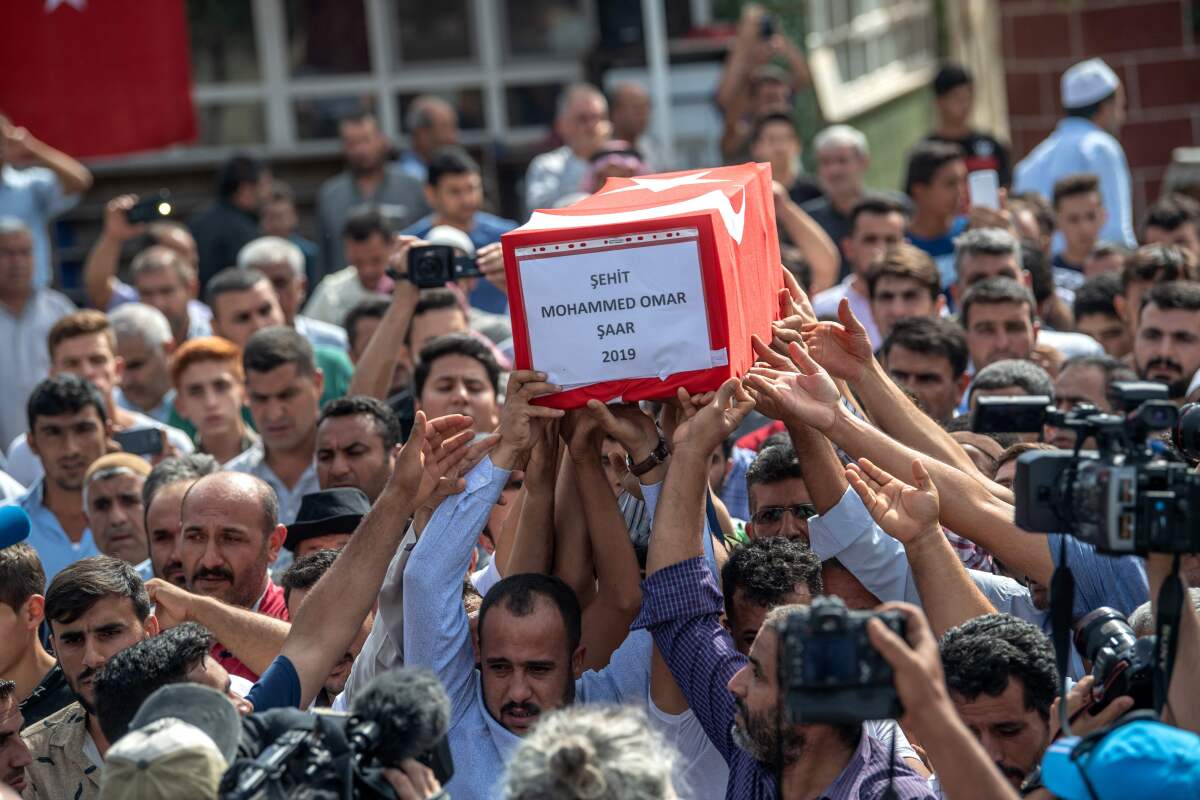Turkey drives deeper into Syria, minister vows to avoid targeting innocent people

- Share via
Amman, Jordan — Turkish artillery and warplanes on Friday battered Kurdish-held territories across northeast Syria, while ground troops and allies overran 14 villages on the periphery of two strategic towns along the border, Turkey’s military said.
Turkish Defense Minister Hulusi Akar, referring to Kurdish fighters, said 342 “terrorists have been neutralized” since the start of cross-border military operations on Wednesday, according to the state-run Anadolu news agency.
The incursion called Operation Peace Spring involves a heavy barrage in a region controlled by the Syrian Democratic Forces, Kurdish-led militias that for years have received U.S. backing in the fight against Islamic State militants.
The assault announced by Turkish President Recep Tayyip Erdogan began after President Trump announced early this week that U.S. troops would be withdrawn from the area, in effect allowing Turkey, an ally, to attack the Kurds, also allies — a move viewed by many U.S. observers, both Democrats and Republicans, as a betrayal.
Turkey has said it wants to push Kurdish fighters from a 20-mile band of territory it calls a safe zone extending along the Syrian-Turkish border. It also has said it aims to resettle millions of refugees who went to Turkey since the start of war in Syria in 2011.
In his speech, Akar said that “only terrorists and their shelters, positions, weapons, ammunition depots and equipment are targeted,” and that the attack would avoid targeting “innocent people.”
Yet there were civilians among the dead on both sides of the border. The Kurdish Red Crescent reported 11 civilians killed, while Kurdish shelling on Turkish border towns including Akcakale killed six people, including an 11-month-old baby, according to Turkish media.
The funeral for the child, Mohammad Omar Saar, was broadcast from Akcakale, with footage depicting Turkish soldiers in ceremonial attire carrying and then saluting a small coffin draped in the red of the Turkish flag.
Later Friday, several artillery shells landed near a U.S. observation post in the Kurdish-controlled city of Kobani, some 35 miles northwest of Tal Abyad, Syria. A U.S. official, speaking on background, said no troops were harmed. Turkey’s Defense Ministry denied it had targeted the observation post.
The Turkish military has the coordinates for U.S. positions; the attack was not considered a direct one, said the U.S. official, even if it was “reckless.” The U.S. personnel departed the post.
More than 100,000 people have fled the violence, the United Nations said Friday, while the International Rescue Committee aid group estimated that a total of 300,000 could be forced to abandon their homes.
It has disrupted life throughout the Kurds’ enclave, which they established as a semiautonomous area in northeast Syria with U.S. support.
On Friday, a spokesman for the Syrian National Army, a Turkish-backed grouping of Syrian rebel factions, said they had controlled villages surrounding Tal Abyad and Ras al-Ayn, two strategic areas Turkey needs to bolster its drive into Kurdish-held territory, but had yet to enter the towns.
The aid group Doctors Without Borders said the main hospital in Tal Abyad had been closed after medical staff left with their families.
Some hospitals elsewhere in Kurdish-controlled areas had also shuttered their doors, activists said, while those still receiving the wounded were “stretched beyond their capacity.”
The shelling also struck critical infrastructure, including water stations, causing shortages in many areas.
In the turmoil, Islamic State planted a car bomb near a restaurant in the city of Qamishli, the group said, leaving behind “dozens” of casualties among the Kurdish fighters. The Syrian Observatory for Human Rights, a pro-opposition watchdog group, said six people were killed.
NATO Secretary-General Jens Stoltenberg, at a news conference Friday with Turkish Foreign Minister Mevlut Cavusoglu, acknowledged what he called “Turkey’s legitimate security concerns,” but said he expected Turkey “to act with restraint.” He said he was concerned about further destabilizing the region, and “even more human suffering.”
“We have a common enemy — Daesh,” Stoltenberg said, referring to Islamic State by its Arabic acronym. “A few years ago, they controlled significant territory in Iraq and in Syria. Working together in the global coalition, we have liberated all this territory and millions of people. These gains must not be jeopardized.”
U.S. Defense Secretary Mark Esper, meanwhile, spoke to his Turkish counterpart by phone, according to a Pentagon statement released Friday, in which he said that the incursion could risk “serious consequences for Turkey” and that its action could harm remaining U.S. personnel in Syria.
Esper, the statement said, “strongly encouraged Turkey to discontinue actions in northeast Syria” before the situation became “irreparable.”
Erdogan, speaking later in Istanbul, said Turkey was receiving pressure to stop but “will not turn back,” according to Anadolu.
More to Read
Sign up for Essential California
The most important California stories and recommendations in your inbox every morning.
You may occasionally receive promotional content from the Los Angeles Times.














